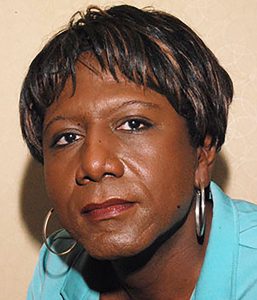Monica Roberts and Janet Mock are making their own history on stage at 10:45 a.m. Thursday in the Amphitheater.
Monica Roberts, award-winning editor of the blog “TransGriot,” will interview Mock, author of New York Times best-seller Redefining Realness: My Path to Womanhood, Identity, Love & So Much More. Mock and Roberts are both trans women of color.
“I’m honored to be on that historic Chautauqua stage with Janet … and making a little history of our own — having two trans women on that stage who are unapologetic about it is historic in itself,” Roberts said. “As part of that series, ‘Pushing Our Bodies’ Limits,’ we’re looking at the fact that [as] trans people, historically, we fit into the narrative of this week’s series of talks. We are changing our bodies to fit the person that we know we are and have been fighting to be since childhood.”

A few terms to understand, as outlined in the GLAAD Media Reference Guide:
• Sex is the assignment male or female given at birth.
• Gender identity is a person’s “internal, deeply held sense of one’s gender,” which might not match their sex and can include identifying as a woman, a man, both or neither.
• Gender expression can be done through names, pronouns, clothing, haircut and other external factors.
Transgender, or trans as some people such as Mock and Roberts use, is an adjective used to describe a person who identifies differently than the sex they were assigned at birth, according to the guide. Cisgender means a person identifies with the sex they were assigned with at birth.
“I feel like in the last year and a half we’ve had a lot of conversations specifically around trans people and culture — creating culture,” Mock said in a New York Times “Op-Talk” Q-and-A. “I hope that in five years that’s not something that’s new, it’ll continue to be there, tracking from Laverne Cox in ‘Orange Is the New Black’ to ‘Transparent,’ that there will continue to be powerful stories that show the humanity of trans people, that they’re part of our communities, they’re part of our lives. They’re not just isolated figures that we objectify in news stories, or talk about the traumas around them.”

According to her website, Mock also hosts MSNBC’s weekly digital series So POPular! and founded the #GirlsLikeUs social media campaign to empower trans women. She also was a staff editor of People.com.
She came out publicly as trans in a 2011 Marie Claire article, which documents her transition. GLAAD defines transitioning as a “complex process” that can include “personal, medical or legal steps.”
“When I look back at my childhood, I often say I always knew I was a girl since the age of 3 or 4, a time when I began cataloging memories,” Mock wrote in her book, Redefining Realness. “No one — not my mother, my grandmother, my father or my siblings — gave me any reason to believe I was anything other than my parents’ firstborn son, my father’s namesake. But it was my very first conviction, the first thing I grew certain of as a young person.”
Roberts said transition is “not an easy journey — not at all.” For her, it was about being herself.
“All I was trying to do when I transitioned was basically be the best person I could possibly be and live my life,” Roberts said.
Roberts’ blog “TransGriot” uses the tagline “News, opinions, commentary, history and a little creative writing from a proud African-American transwoman about the world around her.” The term “griot” means a West African oral-historian or storyteller. History holds a deep importance for Roberts.
“We need to know what transpired and how we got to this certain point in time — how we got there, what we did right, what we didn’t do right — in order to make more solid decisions in our future progress,” Roberts said. “That’s how we progress from this point. It’s also vital for our trans kids who are growing up now to know who their heroes and sheroes are. It’s just as important not only for them to see a Jazz Jennings or somebody who is their age, but it’s also important to see their elders like Fallon Fox, who is representing in the MMA [Mixed Martial Arts] world, trans people running for public offices, being judges, being in various professions. It’s vital to know that we not only played a role in helping shape this movement and still do, but also important for them to see themselves represented in the culture.”
Roberts said one of her friends calls her “educator-in-chief.” She was writing a weekly column for an LGBT paper in Louisville and started the blog in 2006, when “blogging was starting to take off at that time.”
“I also noticed in the folks that had started trans-specific blogs, they weren’t discussing the issues of importance to trans people of color,” Roberts said. “Not only that, but the vast majority of those were talking about subjects that really didn’t have any relevance in my life as a black trans person and I felt like there was a void that needed to be addressed on that.”
Roberts pointed to Laverne Cox, Mock and Jazz Jennings — a 15-year-old trans girl with the TLC reality show “I Am Jazz” and a YouTube channel that boasts more than 270,000 subscribers — as being among her heroes and sheroes.
When it comes to being an ally of the trans community, Roberts said it’s about calling out misinformation and lies that might be spread about the trans community. Asking for people’s pronouns and respecting that is important.
“[Being misgendered] is not a good feeling at all,” Roberts said. “Especially when it’s done to deliberately dehumanize [and] disrespect people. … It’s really appreciated when people do respect us as the people that we are and especially when allies are doing it.”
Although Roberts said there is much more of conversation about trans issues and understanding the trans community, there’s room to improve the dialogue. A current political topic about the trans community is about regulating restroom use based on assigned sex through state laws.
“I would like to focus more on the humanity of trans people instead what bathroom we use,” Roberts said.
The conversation with trans people about assignments at birth can leave out important factors of a person’s experience and existence, Mock said, in the Times “Op-Talk.”
“I think that by focusing so much on who we were born as or what people perceive us to have been assigned at birth, because we concentrate on that so much, we don’t concentrate on the health care issues, the legislative issues around being able to have your gender marker change, or your name change,” Mock told the Times. “I hope that in five years we know who a trans person is, we know what that means, and we can talk about what it means to exist as a trans person in our culture.”
Mock knows, however, what it means to be a token within other people’s spaces, she said in SuperSoul Session on the Oprah Winfrey Network. She said people hold up tokens of success, to ignore the fact that “many of my sisters are grappling with homelessness and joblessness and a lack of access to health care and education and this deep space of lack pushes them out of hostile homes and intolerant schools and into the streets and prisons and deeper in poverty.”
Roberts said speaking at Chautauqua in New York state brings the topic and possibility to change the fate of the Gender Expression Non-Discrimination Act, a proposed law that prohibits transgender discrimination. GENDA has been made it through the State Assembly seven times but has been halted by the State Senate.
According to a report issued by the National LGBTQ Task Force, 63 percent of its 6,450 trans or gender non-conforming participants experienced serious acts of discrimination, such as job loss, eviction, sexual or physical assault.
“The great irony of my success is that it deludes people into thinking that my success is possible for all those girls and the reality is it is not,” Mock said during her SuperSoul Session. “Just because I clicked my heels and made it out of Oz doesn’t mean everyone can.”
Roberts said she wants to people to walk away with a deeper understanding of what it means to be trans in today’s society.
“What I want [those that attend] to take away is the basics that trans people are part of the diverse mosaic of human life,” Roberts said. “We have interesting stories. We have histories. We have lives. We are an intimate parts of our community and communities in society.”




